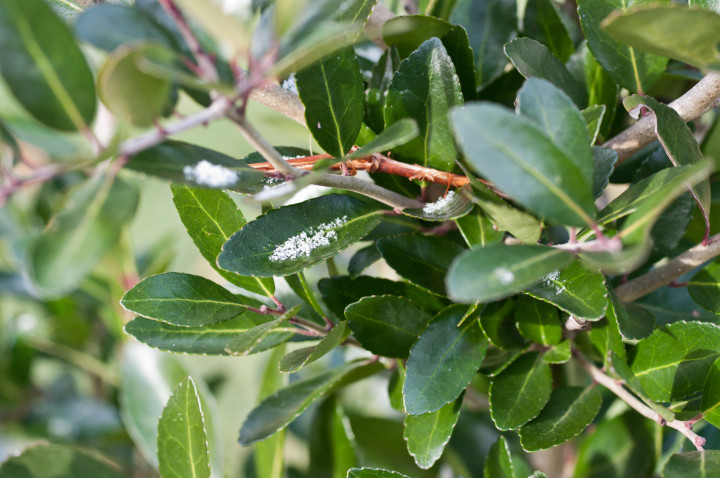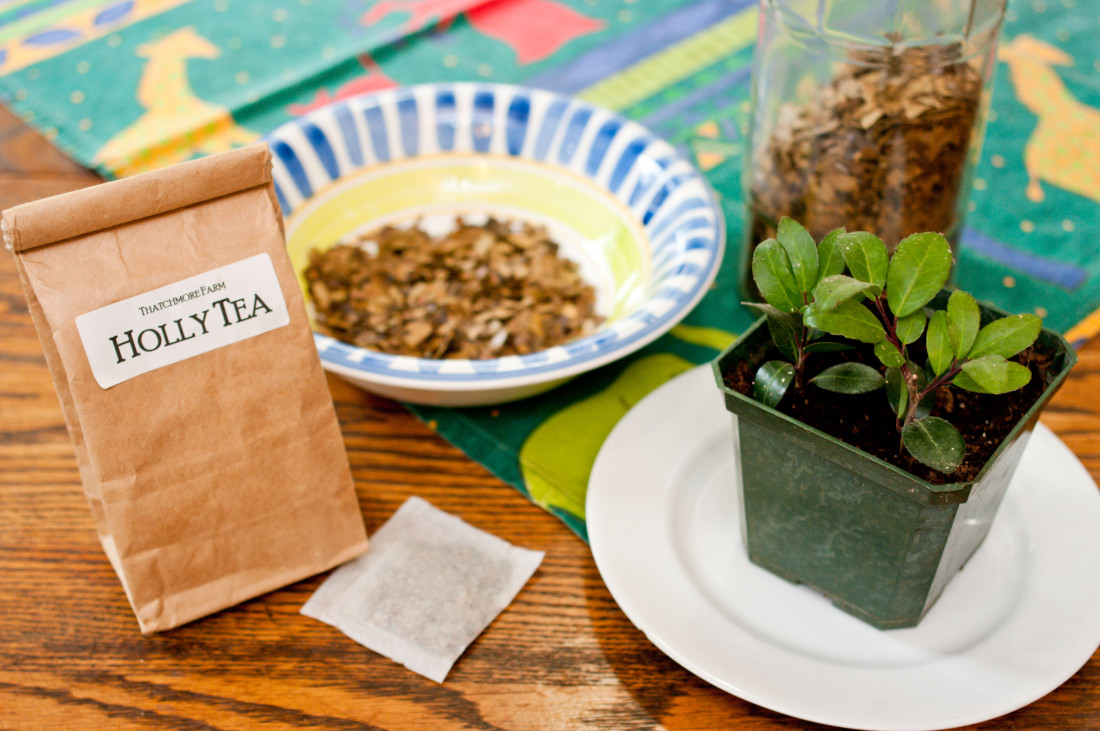Craft beer may be the star beverage in Asheville, but many would argue that this is a city fueled by caffeine. Independent coffee shops are thriving, Ashevilleans know their baristas as well as their bartenders, and the number of local coffee roasters is steadily growing.
Even so, in this area that fiercely prides itself on a strong and ever-growing local food system, coffee beans, with their tropical provenance, are an inherently nonlocal commodity.
So, what if we could source our caffeine buzz from a plant that grows regionally, or even right here in Western North Carolina?
Black drink
Enter the yaupon holly, or Ilex vomitoria. This wild, perennial evergreen shrub is listed by multiple sources as the only plant native to North America known to contain caffeine. With a range that spans the southeastern United States coast from Virginia to Texas, many scholars assert that yaupon leaves were used for centuries by native cultures, and later by European settlers, to make a tea known as “black drink.”
Although its unfortunate Latin name paints it as something you’d be better off avoiding (the vomit-referencing misnomer is based, perhaps, on the tea’s use by certain native tribes during rituals that involved purging), yaupon, in fact, has no emetic properties and yields a very drinkable dark tea. A close relative of the more celebrated yerba mate, yaupon tea is known to be mellower than its cousin with no bitter edge, even after prolonged steeping. It also delivers a pleasantly energizing caffeine buzz, minus the jittery side effects that can accompany coffee.
And it’s good for you, notes Randy Talley, owner of Green Sage Café, who introduced yaupon to Asheville’s coffee shop scene when he began selling the tea by the cup at his three Asheville stores at the end of January. “It was called ‘big medicine’ by Native Americans, or ‘big medicine drink,’” he says, referencing yaupon’s historic reputation among native tribes as a healing plant.
Talley, who intends to plant a grove of 14 yaupon shrubs at his home this year for use as an edible hedge, also touts the tea’s high concentration of antioxidants and theobromine, which is, he points out, “the same thing that’s in chocolate; it makes you feel euphoric.”
An American story
Talley sources his loose-leaf yaupon, which he sells for about $2.50 per cup, from the Savannah, Ga.-based company Asi Yaupon Tea. Asi owner Lou Thoumann, who is candidly passionate about yaupon, owns a barrier island off the Georgia coast from which he sustainably harvests the wild leaves. He then processes and packages them as dried, loose-leaf tea and ready-to-drink, bottled tea for distribution in Georgia, the Carolinas and Alabama.
“The thing about yaupon, is that the more you harvest it, the stronger it gets; you can’t hurt it,” says Thoumann, who adds that the plant is so prolific on the Georgia coast that the residents of other nearby islands regard it as a weed. “They’ve tried to eradicate it, but they can’t get rid of it.” Nevertheless, Thoumann says his team of wildcrafters takes care to only remove about 20 percent of the leaves from each plant when harvesting.
Having learned just a few short years ago about yaupon’s useful qualities during a guided hike on Georgia’s Ossabaw Island with University of Georgia naturalist John “Crawfish” Crawford, Thoumann is now on a mission to learn about and educate the public on the many uses and rich history of the plant. “We’re learning that our real mission to support the brand is to educate people and celebrate Native American foodways,” says Thoumann. “This is a very American story. Yaupon is really the oldest American brand.”

Locally, Asi bottled teas are currently available in a variety of flavors at Whole Foods and Earth Fare stores, at Zuma Coffee in Marshall and at the French Broad Food Co-op. So far, the loose-leaf tea is only available by the cup at Green Sage locations.
From coast to mountains
Having a good-tasting, caffeinated tea-making herb that grows in the Southeast is pretty cool, but that naturally begs the question of whether we can propagate it in Western North Carolina. According to history and at least one local farmer, the answer is “maybe.”
Despite historical references to the Cherokee using the “black drink,” it’s not grown or consumed in the area today, says David Cozzo, project director for the Revitalization of Traditional Cherokee Artisan Resources program at the Eastern Band of Cherokee Indians Extension Center in Cherokee. But perhaps it did once grow here. “There was a reference about a few bushes being near some Cherokee villages in the 1700s,” Cozzo says, “and another reference to the Cherokee as middlemen between the coastal tribes and the interior tribes, but today folks here drink coffee.”
But on a recent February morning, with smallish snowflakes spitting sporadically from low, gray clouds, farmer Tom Elmore stands at the foot of a steep hill on his Leicester farm surrounded by brilliant green yaupon shrubs. “This is a Zone 7 plant,” he explains, touching the oblong leaves of one of the handful of shoulder-high yaupon holly trees he is cultivating. “That means [it grows best in] the Spartanburg, Greenville area. But we’re a Zone 6.”
For three or four years now, Elmore, who with his wife and daughter also grows and markets a diverse array of fruits and vegetables from his family-owned Thatchmore Farm, has been testing the hardiness of a few yaupon cultivars with the hope of finding one of the coast-loving plants that can reliably survive mountain winters. Inspired by his late father, a well-known Knoxville, Tenn., holly expert knows as “Holly Hal,” Elmore’s ultimate goal is to propagate the plants to sell in Western North Carolina.
“The main obstacle is getting over the hardiness problem,” he explains. “So it’s still in the experimental stage to some degree at this elevation. … But there are variations in plants … and over time we’ll select for ones that do well in cold.”
In order to begin introducing the idea of yaupon tea to Asheville, Elmore has already been periodically harvesting and drying small amounts of his yaupon to sell in teabags at the North Asheville and West Asheville tailgate markets and distribute through his Community Supported Agriculture program. Although he says his customers have been excited about it and the demand far exceeds his supply, the finished product is not what he wants to focus on for the long haul.
“I think I could find a market for the tea, but it’s sort of another business than the one I’m drawn to,” he says. “My real interest is in selling the plant and developing our local food culture.”
Looking ahead
Elmore, who is on the board of directors of the Organic Growers School, says that once a cold-hardy yaupon cultivar is identified, he sees great potential for the plant as a local crop option. “It’s a real opportunity for another local food,” he says. “For those of us who are big fans of caffeine, it’s a good way to get that locally without having to rely on international shipments.”
Opportunities exist, too, he says for collaborations among local growers and other entrepreneurs. Blue Ridge Food Ventures, he points out, has an herbal processing center, and A-B Tech Enka has state-of-the-art equipment for doing caffeine testing. “We’re really set up here to promote this product and make it part of the local culture,” he says.
Talley agrees that yaupon could have a bright future in WNC. “I think I recognize if for its potential,” he says. “Coffee, tea and cocoa are all billion-dollar industries. So here’s one that has the potential to be a blockbuster industry in the South because it grows here. It’s our native caffeine.”






Before you comment
The comments section is here to provide a platform for civil dialogue on the issues we face together as a local community. Xpress is committed to offering this platform for all voices, but when the tone of the discussion gets nasty or strays off topic, we believe many people choose not to participate. Xpress editors are determined to moderate comments to ensure a constructive interchange is maintained. All comments judged not to be in keeping with the spirit of civil discourse will be removed and repeat violators will be banned. See here for our terms of service. Thank you for being part of this effort to promote respectful discussion.